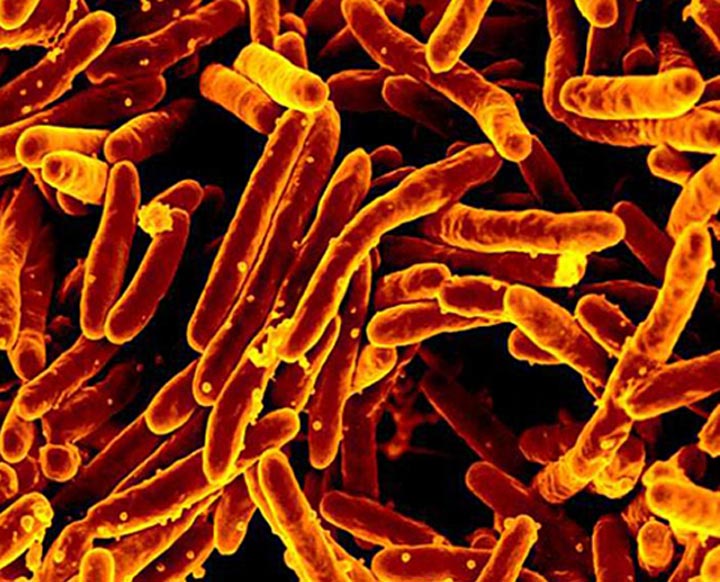Researchers develop novel strategy for tuberculosis vaccine

Produced by the National Institute of Allergy and Infectious Diseases, this digitally colorized scanning electron microscopic image depicts a large group of orange-colored, rod-shaped, Mycobacterium tuberculosis bacteria, which cause TB in humans.
(Photo/National Institute of Allergy and Infectious Diseases)
Innovators at Purdue University and Houston Methodist Research Institute have created a novel strategy for developing an effective vaccine for a widespread form of tuberculosis.
Mycobacterium tuberculosis (Mtb) is a leading cause of death worldwide, leading to over 1.5 million fatalities annually. Approximately one-third of the global population is infected with the latent form of Mtb. Bacillus Calmette-Guérin (BCG) is widely used as a vaccine against tuberculosis but has a variable protection against neonatal and adult pulmonary TB. That protection can, however, range from zero to 80% among infants. Children are routinely vaccinated, yet Mtb dissemination into brain and tuberculosis meningitis continues to occur.
Purdue and Houston Methodist researchers have created this novel TB vaccine formulation by incorporating autophagy-mediated antigen presentation, which initiates an enhanced T cell response. Chinnaswamy Jagannath, professor of pathology and genomic medicine at the Houston Methodist Research Institute, which is an affiliate of Weill Cornell Medical College, showed that the novel formulation improves the development of tuberculosis-specific immune responses. Jagannath collaborates with Dr. Suresh Mittal, Distinguished Professor of Virology in Purdue’s College of Veterinary Medicine.
“Our vaccine approach is equally effective without or with prior vaccination with BCG,” Mittal said.
“It is vital since the majority of people in Mtb-endemic countries are already immunized with BCG,” Jagannath said.
Mittal’s lab studies delivery platforms for vaccines, and Jagannath’s lab used the nasal delivery route for this TB vaccine development.
“The great thing about this work with TB is that it can translate to other infectious diseases and possibly cancer immunotherapy,” Mittal said.
The innovators have worked with the Purdue Research Foundation Office of Technology Commercialization to patent their technology. The innovators and OTC are looking for partners to continue developing it. The next step for the vaccine formulation is to conduct a vaccine efficacy study in a nonhuman primate model. Mittal said the successful completion of the study will form the basis for a human trial, though no human trial is currently planned.
A manuscript describing this work is published in the August 2021 issue of the peer-reviewed Cell Reports Medicine. This research was conducted with research awards from the National Institute of Allergy and Infectious Diseases and Internal Funds.
About Purdue Research Foundation Office of Technology Commercialization
The Purdue Research Foundation Office of Technology Commercialization operates one of the most comprehensive technology transfer programs among leading research universities in the U.S. Services provided by this office support the economic development initiatives of Purdue University and benefit the university’s academic activities through commercializing, licensing and protecting Purdue intellectual property. The office is located in the Convergence Center for Innovation and Collaboration in Discovery Park District, adjacent to the Purdue campus. In fiscal year 2020, the office reported 148 deals finalized with 225 technologies signed, 408 disclosures received and 180 issued U.S. patents. The office is managed by the Purdue Research Foundation, which received the 2019 Innovation and Economic Prosperity Universities Award for Place from the Association of Public and Land-grant Universities. In 2020, IPWatchdog Institute ranked Purdue third nationally in startup creation and in the top 20 for patents. The Purdue Research Foundation is a private, nonprofit foundation created to advance the mission of Purdue University. Contact otcip@prf.org for more information.
About Purdue University
Purdue University is a top public research institution developing practical solutions to today’s toughest challenges. Ranked the No. 5 Most Innovative University in the United States by U.S. News & World Report, Purdue delivers world-changing research and out-of-this-world discovery. Committed to hands-on and online, real-world learning, Purdue offers a transformative education to all. Committed to affordability and accessibility, Purdue has frozen tuition and most fees at 2012-13 levels, enabling more students than ever to graduate debt-free. See how Purdue never stops in the persistent pursuit of the next giant leap at purdue.edu.
About Houston Methodist
Houston Methodist is one of the nation’s leading health systems and academic medical centers. The health system consists of eight hospitals: Houston Methodist Hospital, its flagship academic hospital in the Texas Medical Center, six community hospitals and one long-term acute care hospital throughout the Greater Houston metropolitan area. Houston Methodist also includes a research institute; a comprehensive residency program; international patient services; freestanding comprehensive care, emergency care and imaging centers; and outpatient facilities. Houston Methodist employs more than 26,000 people and has had more than 1.3 million outpatient visits and more than 120,000 admissions in 2020.
Contact: Steve Martin, sgmartin@prf.org
Source: Suresh Mittal, mittal@purdue.edu
Journal: Cell Reports Medicine
Subject of Research: Animals
Article Title: A recombinant bovine adenoviral mucosal vaccine expressing mycobacterial antigen-85B generates robust protection against tuberculosis in mice
Article Publication Date: 17-Aug-2021
All latest news from the category: Life Sciences and Chemistry
Articles and reports from the Life Sciences and chemistry area deal with applied and basic research into modern biology, chemistry and human medicine.
Valuable information can be found on a range of life sciences fields including bacteriology, biochemistry, bionics, bioinformatics, biophysics, biotechnology, genetics, geobotany, human biology, marine biology, microbiology, molecular biology, cellular biology, zoology, bioinorganic chemistry, microchemistry and environmental chemistry.
Newest articles

Silicon Carbide Innovation Alliance to drive industrial-scale semiconductor work
Known for its ability to withstand extreme environments and high voltages, silicon carbide (SiC) is a semiconducting material made up of silicon and carbon atoms arranged into crystals that is…

New SPECT/CT technique shows impressive biomarker identification
…offers increased access for prostate cancer patients. A novel SPECT/CT acquisition method can accurately detect radiopharmaceutical biodistribution in a convenient manner for prostate cancer patients, opening the door for more…

How 3D printers can give robots a soft touch
Soft skin coverings and touch sensors have emerged as a promising feature for robots that are both safer and more intuitive for human interaction, but they are expensive and difficult…





















